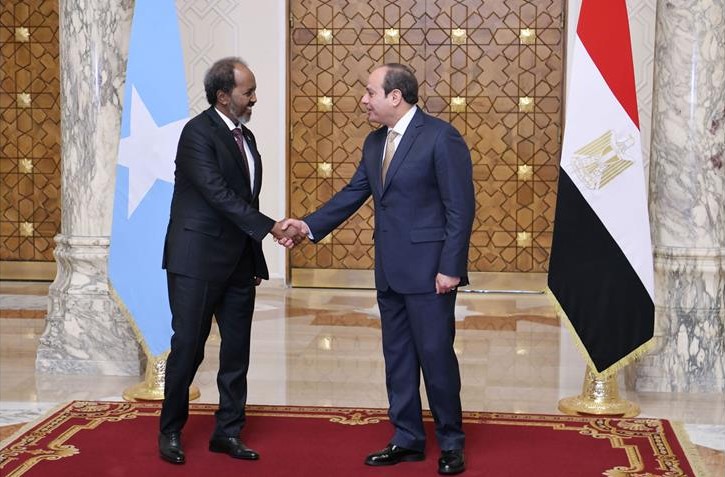Declarations of Support
Egyptian President Abdel Fattah El-Sisi has declared Egypt’s explicit support for Somalia as tensions continue to rise between Ethiopia and Somalia over the Ethiopia-Somaliland Memorandum of Understanding (MoU). The MoU will see Ethiopia granted access to the Somaliland port of Berbera, where they will be able to establish a naval military base, as well as a commercial port on 20km of coastline. In exchange, Ethiopia is to recognize Somaliland’s independence, and eventually establish official ties.
“Egypt will not allow anyone to threaten Somalia or affect its security… Do not try Egypt, or try to threaten its brothers especially if they ask it to intervene” -President El-Sisi
He further added that his “message to Ethiopia is that … trying to seize a piece of land to control it is something no one will agree to”.
The President’s statements came as Somalian President Hassan Sheikh Mohamud visited El-Sisi at the Al-Ittihadiya Palace in Cairo. Mohamud also visited Arab League chief Ahmed Aboul Gheit.
Ethiopia spoke out in condemnation of El-Sisi’s statements, with Redwan Hussein, an Ethiopian National Security Advisor, stating that the deal “isn’t annexation or assumption of sovereignty over the territory of any state”, but rather a “cooperation & partnership that grants Ethiopia access to sea on business terms”.
The ties that bind us are stronger.Our destiny is entwined & inseparable.The signed MoU with Somaliland is a deal for cooperation & partnership that grants Ethiopia access to sea on business terms. It isn't annexation or assumption of sovereignty over the territory of any state
— Redwan Hussien (@RedwanHussien) January 21, 2024
Not the First Time
This is not the first time that tensions have escalated between Ethiopia and Egypt. The construction of the Grand Ethiopian Renaissance Dam saw veiled threats by Egypt toward Ethiopia of military action, as Ethiopia went ahead with the construction of the dam despite staunch Ethiopian, and at times Sudanese, opposition.
The dam was constructed by Ethiopia beginning in 2011, and first opening in 2020, on the Blue Nile River. Egypt fears that the dam’s construction will threaten their water access due to significantly restricting the flow of the Nile, which Egypt relies upon for 97% of their water needs.
Since the announcement of the project up until even now, negotiations on the construction of the dam, it’s function, and specifics of water flow have been subject to a series of negotiations between Ethiopia, Egypt, and Sudan. Repeatedly, however, negotiations have broken down, before being started back up again after months or even years.
Ethiopia constructed the dam in order to address it’s electricity concerns, with large sections of the country having scarce electricity availability.

In 2013, Egyptian political leaders accidentally televised live a meeting in which they were discussing an International Panel of Experts report on the dam where they discussed ways to destroy the dam. Those attending the meeting and discussing the dams destruction were unaware it was being televised live.
In 2021, Egyptian President El-Sisi stated that “I am telling our brothers in Ethiopia, let’s not reach the point where you touch a drop of Egypt’s water, because all options are open”.
Similarly to Egypt, in 2021 an advisor to Sudanese Military Government leader Al-Burhan spoke of a “water war that would be more horrible than one could imagine”.
In 2019, Ethiopian Prime Minister Abiy Ahmed stated that “no force can stop Ethiopia from building a dam. If there is need to go to war, we could get millions readied”.
While the tensions have not resulted in conflict, tensions will likely still continue to rise, as the UN estimates Egypt could “run out” of water by 2025, with the nation being in a water deficit of 7 billion cubic metres per year.
Attempts at Mediation
Several different international entities have attempted to mediate the growing crisis, however no attempts have shown meaningful progress thus far. Recently the Intergovernmental Authority on Development (IGAD), an east African trade-bloc of which both Ethiopia and Somalia are members, hosted a summit on the matter in which they urged respect for Somalia’s sovereignty.

The African Union has sent former Nigerian President Olusegun Obasanjo as an attempted mediator as it seeks a peaceful resolution to the crisis.
However, Somalia has altogether rejected any attempts at mediation, demanding the full withdrawal of Ethiopia from the deal, which they state is an illegal violation of their sovereignty.
Similarly, Ethiopia has shown no signs of backing down from the deal, which they view as a completion of their years long quest for sea access.
The EU, AU, Arab League, US, and several other international entities have all expressed support for Somalia, and urged respect for their sovereignty. Somalia has accused Ethiopia of attempting to annex part of its territory, and stated they will defend it by all means.


